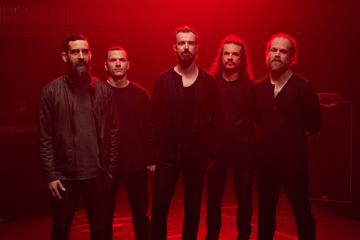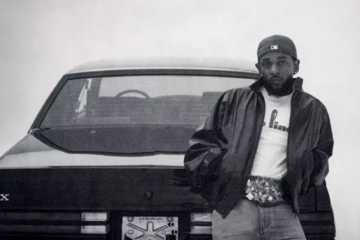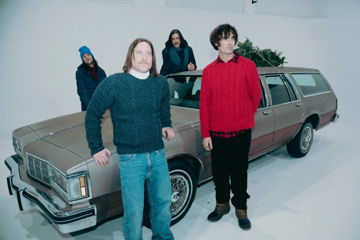EXCLUSIVE: Dave Faulkner On The Declining Sydney Live Music Scene
Read the transcript of the keynote speech that turned into a rally cry
Last night the City Of Sydney held a discussion into the state of live music in the city with a number of key industry stakeholders and advocates offering their opinion.
The night was introduced by the Hoodoo Gurus' frontman Dave Faulkner, who gave an impassioned speech about the plight of the live music industry.He then joined a panel which included Artist Voice's Brett Murrihy, FBi Radio's Dan Zilber, Oxford Art Factory's Mark Gerber and live music advocate John Wardle to discuss live music barriers and possible tax incentives for venues.
Today theMusic.com.au has the transcript of his keynote speech:
Dave Faulkner's Keynote Address
You can't stop the music.
Don't miss a beat with our FREE daily newsletter
Actually, you can.
And we've been stopping the music in New South Wales for nearly 30 years.
But that's finally starting to change.
Tonight we're going to talk about what can be done to halt the decline of live music in Sydney.
We're not talking about outdoor festivals or national concert tours, this is about the entertainment that has traditionally found a home in pubs, clubs and taverns around the state.
But what am I doing here? Well, live music has been good to me. I've been a been a self-employed musician since I was eighteen years old.
I first experienced playing in front of people in high school, in our little rock band. We played the songs that the other kids liked and, most important of all, we were cheap. We even managed to get gigs at other schools. At the time I had no intention of becoming a musician but those early live experiences taught me a lot about performing. And, without my noticing, I caught the music bug.
Let's jump ahead a few years. The Hoodoo Gurus formed in Sydney one memorable New Year's Eve and what had started out as just a bit of fun had turned into "this-is-what-I-want-to-do-with-my-life". A little pub in Surry Hills, The Southern Cross Hotel, became our home base and from there we launched ourselves onto the world. It wasn't long before we started attracting a following and that led to opportunities to open for other bands at bigger venues because they knew we'd bring our crowd with us. Soon we got offers to headline those same venues as we continued to win over audiences one gig at a time.
Without the stepping stones that those earlier, smaller gigs gave us we would never have made it to first base. The music we were playing was not popular - we didn't sound like anything that was on the radio - and when an independent label gave us an album deal it caused great amusement to many in the music industry ("Why are they signing THOSE guys?!") but after two solid years of gigging we had built a market for our music all by ourselves. All we ever needed was a place to play and someone to play to. That's what live music has done for me.
Our career trajectory kept going up but, even back then, we could see that things were changing for those people behind us, the ones just starting out. Gigs were getting scarcer and times were getting tougher. And now, nearly 30 years later, we see that downward trend has continued unabated.
Why has live music been in decline in Sydney for so long and is that decline inevitable? Is it irreversible?
If we look at how small venues continue to flourish in Melbourne we'll see that it isn't inevitable and the successful rejuvenation of the Fortitude Valley entertainment precinct in Brisbane has shown that a downward trend in music venues can be reversed.
But, hang on a second, why do we even need live music? What good is it?
I'll avoid the philosophical side of this discussion for the moment and focus on one of the more obvious benefits, that few would dispute: it stimulates employment and the economy. It puts money into the pockets of a whole range of people: the musicians themselves and their sound and lighting engineers. Yes, the roadies! Then there are all the other people, the ones who serve food and beverages, sell merchandise, and the people who make all those things. There are security staff, booking agents, graphic artists, music shops, cab drivers, and many, many more…the economic benefits ripple outwards throughout society in a very tangible, measurable way.
Tangible? Measurable?
OK, now I'll have to get technical for a minute: recently Ernst & Young, one of The Big Four accountancy firms in the world, were commissioned to study the economic impact of the australian live music industry and they have estimated that during the year 2009/2010 it generated a turnover of $1.2B, for a net value-added gain of $651M.
What is "value-added gain", you ask? Let me quote Ernst and Young: it's "the market value of goods and services produced by an industry, after deducting the cost of goods and services used; AND the number of workers directly employed by the industry, expressed in terms of full-time-equivalent employees".
Got it?
In other words, the profit from the beer, the profit from the meals, all the door money…and where all those profits end up. I'll say it again: Ernst and Young estimated that figure to be $651M for one year.
Of that amount, $47M was clear profit that flowed back to the venue owners themselves but that means more than $600M went to all the musicians, the technical crew, venue staff, security, the "sticky carpet" cleaners and a myriad of other service providers, producing the employment equivalent of 14,876 full-time workers. As we know, the real number of people enjoying those economic benefits is much greater than that as many of them would not be working full-time.
Remember, these figures are ONLY related to gigs at pubs, clubs and taverns around Australia and do NOT include any large-scale concert venues such as theatres, entertainment centres or any outdoor festivals, which is a whole other ball game.
Speaking of ball games, this figure of $651M is only 10% smaller than the equivalent profit generated in one year across ALL of the professional AND amateur sporting clubs in Australia taken together. Yes, Cricket, AFL, Rugby League, Rugby Union, Tennis, Soccer, Basketball and all of the rest, with all of their media profile and government grants, barely produced more economic benefit to our economy than the struggling live music industry!
New South Wales contributed 33% towards that total income - and this is despite several decades of neglect, and even attack on many fronts.
OK, so let's talk about that. Why HAS live music been dying in Sydney?
Firstly, there's no denying the relaxing of laws governing poker machines and other gambling devices in pubs has had a huge impact on live music across the state. Although actual poker machines weren't introduced until a bit later, beginning in 1984 the Wran Government allowed hotels to install up to five gambling machines, euphemistically called "Approved Amusement Devices" (or AADs). (Hmm, I could use some of those! )
In 1988 that number of machines was increased to 10 by Nick Greiner.
Then, in April 1997, Hotels were finally allowed to introduce poker machines (hallelujah!), up to fifteen of them. Less than a year later, the NSW Treasurer Michael Egan extended that limit from 15 machines to 30.
Governments of all stripes in NSW seemed to be rather infatuated with these machines of public "amusement".
The argument is often put forward that poker machines subsidise other less-profitable parts of a hotel's business, such as the bistro and perhaps even live entertainment, but anyone who has spent much time around serious pokie players will know: they DON'T TOLERATE ANY DISTRACTIONS and want to be left to indulge their mindless addiction in near-absolute silence.
Well, apart from all those annoying jingles, chimes, bells and whistles.
Many establishments simply don't have the room to separate entertainment and gambling areas so often its the entertainment that has to go. It's so much easier to take the money straight out of the pockets of mesmerised gamblers - sorry, they're not "gamblers" any more, are they? They're "GAMERS" - than it is to pay for entertainers, extra bar staff and security - and to possibly antagonise neighbours with public entertainment.
Those gamblers are so quiet! Yes, quiet as lambs - or, more accurately, sheep.
That brings me to another huge problem for live venues: neighbours!
Rapid and profound gentrification has resulted in many traditional live venues finding themselves cheek-by-jowl with belligerent, litigation-happy residents - otherwise known as NIMBYs. I call it "The Balmain Syndrome" though it could equally apply to Surry Hills or many other parts of Sydney: a thriving, buzzy neighbourhood attracts well-heeled homebuyers who come for all of the excitement and amenities - then immediately take steps to shut them all down. They appear to harbour fantasies that they live in a castle on a remote mountaintop somewhere - only with better coffee nearby.
The Annandale Hotel is a recent, sad example of what can happen. The owners spent considerable time and money in the Land & Environment Court defending themselves against repeated noise complaints lodged by a single resident. Although the hotel was victorious in this battle the hundreds of thousands of dollars they spent on legal fees could not be recovered as this particular court doesn't have the power to award costs. Defending themselves has bankrupted their business, forcing the owners to sell-up and at the same time it has damaged a cultural landmark and put many jobs at risk.
Until recently legislation in NSW made it incredibly easy for people like "the arch-enemy of the Annandale" to put a damper on, if not destroy, Sydney's nightlife.
In the late '80s, the NSW government brought in the ridiculous POPE laws - POPE stands for Place Of Public Entertainment. Every pub, club and tavern, no matter how small, would no longer be permitted to put on live entertainment, no matter how limited, unless they first applied for a DA to be rezoned as a Place Of Public Entertainment. Neighbours were suddenly able to lodge objections to venues that had been operating without controversy for decades. When - or if - that DA was ever approved, they then had to apply for a separate DA to bring their facilities up to the new code, which included providing extra fire exits with disability access, disabled toilet facilities, total soundproofing, power isolation switches - this last item alone cost $80,000 to install - with annual inspections.After all this there was still no certainty that the licence would continue from one year to the next as a few aggressive neighbours could always get the POPE licence revoked afterwards. Though on the face of it many of these things sound desirable, disabled access and so on, for most of the venues affected the expense of compliance meant they had to spend hundreds of thousands of dollars with no certainty that they would be allowed to operate afterwards.
Many of them just threw up their hands and gave up.
For many of the older hotels, heritage values prevented them from even being able to comply. They couldn't add any new exits or make other required changes. With the stroke of a legislative pen, the live music industry was instantly brought to its knees and all the neighbourhood wowsers and NIMBYs happily put the boot in. These laws led to the ludicrous situation that a pub could have a bistro jam-packed with hundreds of patrons seven nights a week but if just one guitarist set up in the corner of the room then the owner would have to outlay enormous sums of money as well as run the gauntlet of endless government regulations and community objections.
It's a wonder any live music venues stayed open at all!
As if that wasn't enough, all through this period Sydney had some of the most onerous liquor licensing laws in the country. To open a venue in Sydney the liquor licence alone would set you back around around fifty thousand dollars. Restaurant licences were much cheaper but woe betide you if you ever wanted to serve someone a drink without a meal - and if just one guitarist should set up in the corner? Then you were really asking for trouble!
So what was happening elsewhere?
In 1987, a full year before NSW brought in the stupid POPE laws, Victoria was instead reforming their liquor licensing laws making it much easier for enterprising people to open a bar - it could almost be done on the smell of an oily rag - and the plethora of new bars that sprung up around Melbourne afterwards created many opportunities for performers. Melbourne now enjoys a diverse and rich musical culture that we have long been denied in Sydney.
It only took 25 years to happen but I'm glad to say that those POPE laws are now ancient history. Three years ago the NSW Government introduced a simpler and fairer approval system for live entertainment, mainly thanks to the efforts of concerned activist-and-music-lover John Wardle, who is on this stage tonight. John waged a campaign almost single-handedly over many years to get those laws revoked. Not long before that happy event our crazy, anti-competitive liquor laws also became a thing of the past and there has already been a big upswing in the number of small, funky venues offering niche entertainment around this city as a result.
Of course, these wrong-headed laws have caused incredible damage to our live music scene over a very long time - thirty years in fact - and there are still many challenges ahead.
One of the biggest challenges facing us is what we can do about the lack of medium-sized, licensed venues, those fabled beer barns of long ago. Many of them have simply vanished, extinct like the dinosaurs, now overgrown by forests of pokies or re-purposed as super-screen sports betting lounges, partitioned off with coffee shops for "gamers" so that they can get a quick, cheap snack and hurry back to their "gaming". Are those showrooms lost to music forever?
In a few minutes we'll start our panel discussion and some of the other people up here will canvass a few ideas they've had to continue the good work that John Wardle and others have begun, giving their ideas on how to rebuild a vital live music industry for all of us to enjoy.
I'd just like to finish off with some of that philosophical stuff I avoided earlier. So, why DO we need live music? What is it good for?
One of the best things music does is it bypasses the conscious mind and the ego and goes straight to our emotions. The communal enjoyment of live music creates a kind of spiritual alchemy among the participants, audience and performer alike, making friends of strangers, everyone united by a shared, joyful experience. I've been going to gigs all my life, all over the world, both as a performer AND as a member of the audience, and it never ceases to amaze me how the energy flows back and forth through the room: the music SOUNDS better live because the music IS better live. Somehow the collective unconscious of everyone there has MADE it better. People gathering together making and enjoying music is a spiritual experience as old as humanity itself.
As Plato said, "Music gives a soul to the universe, wings to the mind, flight to the imagination and life to everything".
Let the music speak to you and speak for you.
You can't stop the music.







